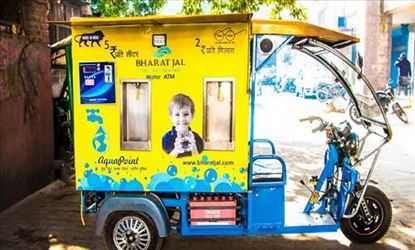
Clean Drinking Water’ was declared as a Human Right by the UNO in the year 2010 and yet, the WHO lists it as one of the Top 10 Global Needs. Ironic as it may sound, getting access to clean drinking water in India is a privilege. Today, with the advent and penetration of technology, most of the urban and rural populace in India has access to smartphones but the basic need of clean drinking water still eludes them. India has more people in rural areas – approximately 63.4 million – living without access to clean water more than any other country, according to Wild Water, State of the World’s Water 2017 new report by WaterAid, which is more than the combined population of Punjab, Haryana and Uttarakhand. Compared globally, that equals the total population of Australia, Sweden, Sri Lanka and Bulgaria.

Keeping this burning social issue as the premise, Bharat Jal today, embarks on a journey to set up small (2000LPH) water plants at multiple locations in the Delhi NCR Region and supply water through Electric 3—wheeler vending machines. The company has launched its operations with its maiden plant at Nehru Place.
In the words of Mr. Feroz Malik, Founder & CEO, Faat City Tech Pvt. Ltd., “Clean drinking water is a luxury in various parts of our country, especially rural areas. According to research, only 18 percent of the total rural population of 833 million has access to treated water. In comparison, 41 percent of the rural population, or 346 million people, own mobile phones. This alarming statistic reflects the way we are developing as a nation. I felt that there is a massive vacuum to be filled and thus gave birth to Bharat Jal, with which we aim at providing clean and safe water to the citizens by taking water directly to them through mobile vending machines to cut and control the level of contamination. The clean yet affordable drinking water will now travel to the customer instead of the other way round. Cutting through red tapism and bureaucratic mindsets, Bharat Jal will cater to this basic and real need of the people.”
He further added, “We aim at taking mobile water ATMs to all parts of the country through a network of franchise by 2019.”
In the initial phase catering to NCR, the company shall procure water from the Delhi Jal Board, which will be treated and then supplied to the locales. As the company expands into other states, it will work in tandem with the State Local authorities and local civic bodies for facilitating the supply of clean drinking water to the masses. To keep a record of the water levels in the ATMs, an in-house mobile application has been developed, the authorization of which lies with Mr. Feroz Malik, without whose supervision the mobile water ATMs cannot be refilled, thereby subduing the fear of contamination.
Through its franchise initiative, Bharat Jal will liaise franchises at a bare minimum investment with high rate of turnover in two years, thereby inviting locals from various Tier 2/3 cities and towns as well, which in turn will create more job opportunities at the local level. The company aims to disseminate information and technology to local set-ups to be more effective to supply water.
The First Phase will seek funding for the project from the Promoters to set up plans in the Delhi NCR Region. In the next few quarters, Bharat Jal will look at raising raise debt and minor investments through the franchise model to spread its wings across the country.
Bharat Jal – The Need?
Research reveals a gloomy picture
With 67% of India’s population living in rural areas and 7% of the rural population living without access to clean water, India’s rural poor are highly vulnerable to the effects of extreme weather events and climate change. Only 26.9 million out of 167.8 million households (16%) in rural India have piped water, according to data provided by the Ministry of Drinking Water and Sanitation to the Rajya Sabha on February 6, 2017.
Of 1.7 million rural habitations provided drinking water under the National Rural Drinking Water Programme, 1.3 million (77%) habitations are fully covered–defined as having at least 40 litres per capita per day (LPCD)–that is nearly two standard buckets-of safe water; 330,086 (19.3%) habitations are partially covered (safe water is available but below 40 LPCD) and 64,094 (3.73%) are “water-quality affected habitations” – meaning those with contaminated water – in the rural areas as on March 15, 2017.
WHO estimates that in India, waterborne diseases affect approximately 38 million people each year, of which over 75% are children; 780,000 deaths are attributable to contaminated water and more than 400,000 deaths be attributed to diarrhoea alone. India also ranks a dismal 120 out of 122 nations for its water quality and 133rd out of 180 nations for its water availability. While Bharat Jal is working on a number of initiatives to better the daily lives of Indians, their major focus remains on saving the future generation from waterborne diseases by providing clean, safe and treated drinking water. Bharat Jal offers unprecedented solutions for purified water for individual clients from all walks of life, government bodies and corporate(s) alike, thereby making it a win-win situation for everybody.




